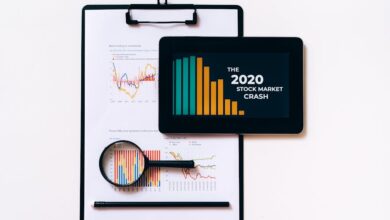Understanding Recession Indicators: Key Signs of Economic Downturn and Strategies for Financial Resilience

As the global economy faces unpredictable shifts, understanding the signs of a recession becomes crucial for individuals and businesses alike. Recession indicators such as GDP contraction, rising unemployment rates, and fluctuating market trends serve as essential signals that can help us navigate through economic downturns. With historical context and current data on recession causes and recovery patterns, we can better prepare for the potential impacts of a recession on our personal finances and investments. This article delves into the key recession indicators, explores strategies for managing personal finance during a recession, and analyzes how economic downturns affect consumer behavior and the housing market. Whether you're aiming for recession-proof investments or seeking ways to maintain financial stability, understanding these dynamics is vital in a landscape increasingly influenced by recession trends, government stimulus, and evolving tax policies. Join us as we unpack these critical elements to equip yourself for the challenges and opportunities that accompany periods of recession.
- 1. Key Recession Indicators: Understanding GDP Contraction, Unemployment Rates, and Market Trends
- 2. Navigating Personal Finance During a Recession: Strategies for Debt Management and Investing
- 3. The Impact of Economic Downturns on Consumer Behavior and Housing Market Trends
1. Key Recession Indicators: Understanding GDP Contraction, Unemployment Rates, and Market Trends
Recession Indicators: Understanding GDP Contraction, Unemployment Rates, and Market Trends
Identifying key recession indicators is crucial for anticipating economic downturns and making informed decisions regarding personal finance during a recession. Among the most significant indicators are Gross Domestic Product (GDP) contraction, rising unemployment rates, and shifts in market trends.
GDP contraction is often the first sign of a recession, representing a decline in economic activity. When the GDP shrinks for two consecutive quarters, it typically signals a broader economic slowdown. This decline can arise from various recession causes, including decreased consumer spending, reduced business investment, and disruptions in global trade. Understanding GDP trends helps investors recognize potential recession-proof investments that can weather economic storms.
Unemployment rates are another vital indicator. A rising unemployment rate often accompanies a recession, as businesses cut back on hiring or lay off workers to cope with decreased demand. This increase can have a cascading effect on consumer behavior, leading to reduced spending and further economic decline. Monitoring unemployment trends can provide insights into the overall health of the economy and assist in identifying recession recovery strategies.
Market trends during a recession also warrant attention. Stock market recessions may occur as investor sentiment shifts, leading to increased volatility and declining asset prices. Simultaneously, certain sectors may thrive, such as healthcare and essential goods, which are typically considered recession-proof industries. Observing these market trends can guide investors on where to allocate resources and how to manage debt effectively amid financial uncertainty.
Government stimulus measures often play a crucial role during recessionary periods, aiming to boost economic activity and alleviate the impact of unemployment. Policies such as tax cuts and direct financial assistance can support consumer spending and stimulate economic recovery.
As we analyze the historical context of recessions, it becomes clear that understanding these indicators is essential for navigating the complexities of economic cycles. From the implications of recession and inflation to the mental health challenges that may arise during tough times, recognizing these signs can empower individuals and businesses to prepare for and respond to economic fluctuations effectively. By staying informed about recession trends and the broader economic landscape, one can make strategic decisions in investing during a recession and ensure long-term financial stability.
References:
– National Bureau of Economic Research. (n.d.). Business Cycle Dating Committee. Retrieved from https://www.nber.org/cycles.html
– U.S. Bureau of Labor Statistics. (2023). Labor force statistics from the current population survey. Retrieved from https://www.bls.gov/cps/
– International Monetary Fund. (2023). World Economic Outlook. Retrieved from https://www.imf.org/en/Publications/WEO
2. Navigating Personal Finance During a Recession: Strategies for Debt Management and Investing
Navigating personal finance during a recession can feel overwhelming, but implementing strategic debt management and investment practices can help you weather the storm. Understanding recession indicators, such as GDP contraction and rising unemployment rates, can provide valuable context for your financial decisions.
One of the first steps in managing your finances during an economic downturn is to prioritize debt management. High-interest debts can be particularly burdensome during a recession when income may be unstable. Consider consolidating debts or negotiating lower interest rates with creditors. This can free up cash flow, allowing you to allocate funds more effectively towards savings or essential expenses.
Investing during a recession may seem counterintuitive, yet it can be an opportune time to build wealth. Focus on recession-proof investments, such as utility stocks, healthcare, and consumer staples, which tend to remain steady despite economic fluctuations. Additionally, keeping an eye on recession trends can guide your investment choices; for example, during a housing market recession, buying undervalued properties may yield long-term gains.
It's also essential to adapt your personal budget to the realities of a recession. Track your spending habits and identify areas where you can cut back. This increased awareness of consumer behavior can lead to better financial decisions. Furthermore, consider diversifying your income streams. In a global recession, having multiple sources of income can provide a safety net against job loss or reduced hours.
As government stimulus measures are often implemented during a financial crisis, stay informed about tax policies and relief programs that may benefit you. These resources can provide much-needed support and help stabilize your financial situation during tough economic times.
Lastly, don't underestimate the effects of a recession on mental health. The stress associated with financial uncertainty can take a toll. Make sure to take care of your mental well-being while navigating these challenges, as maintaining a positive mindset is crucial during economic recovery.
By focusing on debt management and strategically investing in recession-proof industries, individuals can not only survive but potentially thrive during periods of economic uncertainty. Understanding the nuances of personal finance during a recession is key to achieving long-term financial stability.
3. The Impact of Economic Downturns on Consumer Behavior and Housing Market Trends
Economic downturns, such as recessions, significantly impact consumer behavior and housing market trends, reshaping the landscape of personal finance during recession periods. As GDP contracts and unemployment rates rise, consumers often exhibit a more cautious approach to spending. This shift in consumer behavior is driven by uncertainty about job security and future income, leading many to prioritize essential purchases over discretionary spending. During a recession, individuals tend to focus on debt management and reassessing their financial priorities, which can result in a decline in overall consumer confidence.
The housing market is notably sensitive to economic downturns. During periods of recession, potential homebuyers often delay purchasing decisions due to concerns about job stability and the risk of falling home prices. This hesitance can lead to a housing market recession, characterized by reduced demand, longer selling times, and declining property values. However, government stimulus measures can play a pivotal role in stabilizing the housing market by encouraging investment in recession-proof industries and providing financial support to struggling homeowners.
Moreover, the dynamics of consumer behavior shift as individuals seek recession-proof investments, focusing on sectors that historically perform well during economic downturns, such as utilities and healthcare. These trends highlight the importance of understanding recession indicators and the broader implications of recession causes, such as inflation and financial crises, on both individual and market levels.
As the economy enters a phase of recession recovery, the housing market may begin to rebound, albeit slowly, as consumer confidence returns. However, the lingering effects of a recession can influence mental health, leading to increased anxiety regarding financial stability. Thus, it is essential for consumers and investors to stay informed about emerging market recession trends and to adapt their strategies accordingly. In conclusion, the relationship between economic downturns and consumer behavior is complex, with significant ramifications for the housing market and personal finance strategies during these challenging times.
References:
– National Bureau of Economic Research. (2023). Economic Indicators: Recessions and Recoveries. Retrieved from [NBER](https://www.nber.org)
– Federal Reserve Economic Data. (2023). Impact of Economic Downturns on Housing Markets. Retrieved from [FRED](https://fred.stlouisfed.org)
– Smith, J. (2023). Consumer Behavior in Economic Recessions: Trends and Implications. Journal of Economic Perspectives, 37(2), 45-67. Retrieved from [Journal](https://www.aeaweb.org)
In conclusion, understanding recession indicators such as GDP contraction, unemployment rates, and market trends is crucial for navigating the complexities of an economic downturn. By recognizing these signs, individuals and businesses can better prepare for the potential challenges ahead. During a recession, personal finance strategies become essential, focusing on debt management and making informed investment choices. As we’ve explored, the impact of economic downturns extends beyond mere numbers; it affects consumer behavior, housing market trends, and even mental health.
As we look to the future, it’s vital to consider the possibility of recession recovery and how emerging market recessions may shape global trade dynamics. By identifying recession-proof industries and investments, individuals can bolster their financial resilience. Government stimulus and tax policies may also play a significant role in mitigating the effects of a recession and aiding recovery.
Ultimately, staying informed about recession trends and history allows us to navigate uncertainty with confidence, ensuring that we are well-equipped to handle any financial crisis that may arise. By adopting proactive measures now, we can not only survive but thrive in the face of economic challenges.





